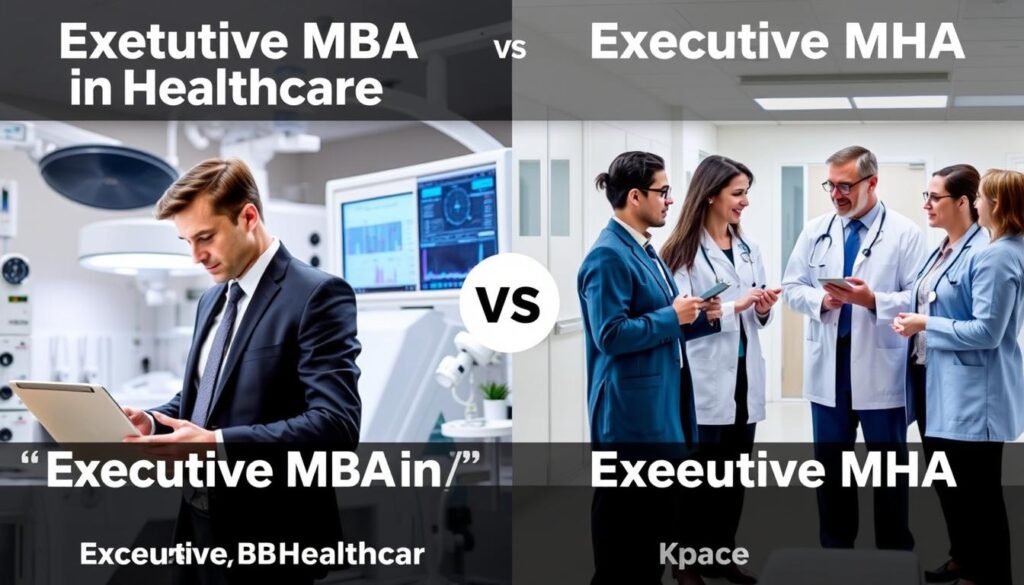The healthcare industry is facing big challenges and changes. These include more government spending, changing consumer needs, new ways to deliver care, and technology changes. There’s also a move towards more integrated business models. To tackle these issues, the industry needs leaders who can be efficient, think deeply, and lead change.
An executive MBA in healthcare gives the skills needed to become a leader. It combines business knowledge with healthcare expertise. This way, graduates can make a big difference in their workplaces right away.
Key Takeaways
- The healthcare industry is undergoing significant transformation, creating a need for skilled and confident leaders.
- An executive MBA in healthcare provides the necessary business acumen and healthcare specialization to develop transformational leaders.
- Graduates of an executive healthcare MBA can make an immediate impact in their organizations by applying advanced business leadership principles in a healthcare context.
- The program aims to equip healthcare professionals with the tools to navigate the complexities of the modern healthcare system.
- Top executive healthcare MBA programs incorporate enhanced learning experiences, such as intensive residencies, personalized leadership development coaching, and applied project work.
The Evolving Landscape of Healthcare
The healthcare industry has changed a lot in recent years. This change is due to the COVID-19 pandemic, new technologies, and what patients want. Healthcare organizations face both challenges and chances for growth. They need strong leaders to guide them through these changes.
Challenges and Opportunities in the Post-COVID Era
The COVID-19 pandemic has deeply affected healthcare. It brought many challenges, like shortages and supply chain issues. But it also pushed for new ways to care for patients, like telemedicine.
Telemedicine lets doctors see patients from afar. This helps people in areas with little access to healthcare. The pandemic also showed how important using data is. Healthcare groups use data to make better decisions and improve care.
The Need for Skilled and Confident Healthcare Leaders
To keep up with healthcare’s changes, organizations need leaders who can lead big changes. Healthcare leadership skills like planning, managing money, and handling change are key. These leaders must understand the industry’s complexities and make decisions based on data.
They also need to have a clear vision for their organization’s future. This vision must align with the changing healthcare industry.
“Business-building capability is a key component to succeed in this new environment,” writes McKinsey & Company.
As healthcare keeps changing, the need for skilled leaders will grow. Organizations that focus on developing these leaders will do well in the future.
What is an Executive MBA in Healthcare Leadership?

The Executive MBA in Healthcare Leadership (EMBA-HL) program at the University of Tennessee, Knoxville’s Haslam College of Business is for those ready to lead in healthcare. It teaches skills for managing today’s healthcare system. The program covers systems thinking, business strategies, and leadership, all with a healthcare focus.
Differentiating Executive Healthcare MBA from Other Programs
The EMBA-HL program is unique compared to other healthcare-focused programs. It focuses on business skills and strategic leadership. This is different from programs like the EMHA, which mainly deals with healthcare administration.
| Program Comparison | Executive MBA in Healthcare Leadership | Executive MHA (Master of Healthcare Administration) |
|---|---|---|
| Program Duration | 22 months | 18-24 months |
| Curriculum Focus | Business strategy, leadership, and healthcare management | Healthcare administration, operations, and policy |
| Experiential Learning | Capstone project with real-world healthcare organizations | Internships and field projects |
| Networking | Global alumni network of over 250,000 Cornellians | Primarily regional or program-specific alumni network |
Choosing the executive healthcare MBA program helps leaders develop a broad skill set. They learn strategic business skills and how to lead change in their organizations.
Core Competencies of an Executive MBA In Healthcare

An Executive MBA (EMBA) in Healthcare Leadership gives professionals key skills for success in healthcare. These programs offer the usual MBA business knowledge. But they also focus on healthcare-specific areas.
Business Acumen and Healthcare Specialization
EMBA-HL programs cover important business topics like accounting and finance. They also look at marketing, operations, and leadership through a healthcare lens. Students learn about quality management and healthcare policy, understanding the sector’s unique challenges and chances.
Enhanced Learning Experiences and Applied Projects
EMBA-HL programs go beyond classroom learning. They include intensive residencies and personalized coaching. Students work on real projects, applying what they’ve learned to solve healthcare issues.
| Key Competencies Developed | Practical Applications |
|---|---|
|
|
By mixing business skills with healthcare knowledge and hands-on learning, an Executive MBA in Healthcare Leadership prepares leaders. These leaders are ready to face the changing healthcare world.
Comparing Executive MBA and Executive MHA Programs

Healthcare professionals looking to grow in their careers often face a choice. They must decide between an Executive MBA in Healthcare and an Executive Master of Health Administration (MHA) program. Both are designed for mid- to senior-level managers. Yet, they differ in focus and approach.
Program Duration and Curriculum Focus
Executive MHA programs usually take two years or more to finish. They focus on the basics of healthcare management and administration. Students learn about the healthcare system, regulations, and how organizations work.
On the other hand, executive healthcare MBA programs last from one to two years. They emphasize advanced business leadership skills. These skills are useful in healthcare and other industries. The curriculum is designed for seasoned managers to excel in executive roles.
Experiential Learning and Peer Collaboration
Executive healthcare MBA programs highlight experiential learning and teamwork. Students work on real-world projects and case studies. This hands-on approach helps them apply what they learn.
Executive MHA programs also have experiential elements. But they focus more on healthcare management basics. The teamwork aspect is less emphasized, as students come from mostly healthcare backgrounds.
Choosing between an executive healthcare MBA and an executive MHA depends on your goals and experience. Both programs help healthcare professionals improve their business skills and leadership. They prepare you for the changing healthcare world.
Executive MBA In Healthcare: Developing Transformational Leaders

Executive healthcare MBA programs, like the EMBA-HL at the University of Tennessee, Knoxville, aim to create leaders in healthcare. They combine executive coaching, leadership development, and sharing of ideas. This prepares students to lead change in the healthcare world.
Executive Coaching and Leadership Development
These programs focus on coaching and developing leaders. Students get one-on-one coaching to try new methods and reflect on their growth. This hands-on learning boosts their self-awareness, decision-making, and strategic thinking.
Cross-Pollination of Ideas and Perspectives
Executive healthcare MBA programs also offer diverse perspectives. They mix healthcare professionals with different backgrounds. This mix of ideas helps students adapt to healthcare’s changes.
Through coaching, development, and diverse perspectives, students become transformational leaders. They can lead positive change, better patient care, and shape healthcare’s future.
“Transformational leadership in healthcare is correlated with effective nursing unit organizational culture and structural empowerment, leading to improved staff retention and stability.”
| Key Features | Outcomes |
|---|---|
|
|
The Unique Value Proposition of an Executive Healthcare MBA
The Executive MBA in Healthcare Leadership is a top choice for healthcare pros looking to grow their careers. It combines business smarts with healthcare know-how. This mix gives graduates the tools to lead change and add value right away.
This program focuses on the link between business and healthcare. Students learn about healthcare economics, policy, and more. They become strategic leaders who can drive progress and better patient care.
With only 30 students, the program offers a close-knit learning space. It’s perfect for sharing ideas and building a strong network. These connections are key for tackling the healthcare industry’s challenges.
| Job Title | Percentage of Participants |
|---|---|
| Senior Manager / Manager | 27% |
| Senior Executive | 23% |
| Director | 23% |
| CEO / C-Suite | 19% |
| Clinician | 8% |
The program is highly respected, ranking high in publications like The Economist and Financial Times. It’s also recognized for supporting military families. This shows its dedication to helping all students achieve their goals.
The Executive MBA in Healthcare Leadership at HEC Paris is a game-changer. It boosts business skills and healthcare knowledge. Graduates are ready to lead and make a real difference in healthcare.
“The program has been an invaluable asset in my career, allowing me to apply business principles and strategies to tackle complex healthcare challenges. The knowledge and network I’ve gained have been instrumental in driving positive change and improving patient outcomes.”
– Dr. Quoc-Dien Trinh, HEC Paris EMBA Alumnus
Making an Impact in Healthcare with an Executive MBA
Graduates of an Executive MBA in Healthcare program are ready to make a big difference. They can work in many areas like medicine, insurance, and healthcare IT. The program teaches them to lead and understand the healthcare world well.
They learn to build businesses, lead teams, and grasp the healthcare system. This prepares them for roles like clinical leadership and healthcare administration. They can also manage in pharmaceuticals or start their own healthcare businesses.
Also Read: Trends Shaping The Future Of Healthcare Marketing
Career Paths for Healthcare Executives
The Executive MBA in Healthcare opens doors to many career paths. Doctors like Dr. Ebbers and Dr. Kern moved into leadership roles after the program. They became medical directors and supply chain managers.
The program also prepares them for executive roles in healthcare and pharmaceuticals. It focuses on finance, operations, and making decisions. This helps them succeed in big healthcare companies and medical technology firms.
For those who want to start their own businesses, the program is a great start. It mixes clinical knowledge with business skills. This way, graduates can spot needs, create solutions, and bring change to the industry.
They work on real projects and meet industry leaders. This helps them develop entrepreneurial skills and navigate the healthcare world.
FAQs
Q: What are the key benefits of pursuing an Executive MBA in Healthcare?
A: An Executive MBA in Healthcare offers several key benefits including enhanced leadership skills, networking opportunities with industry professionals, a deeper understanding of healthcare management, and the ability to apply business principles specifically to the healthcare sector, ultimately preparing graduates for senior roles in health care organizations.
Q: How does an Executive MBA program differ from a traditional MBA program?
A: The Executive MBA program is designed for working professionals with significant experience, focusing on advanced management skills and leadership. In contrast, a traditional MBA program may cater to a broader audience, including those early in their careers, and often includes more foundational business courses.
Q: What specific skills can I gain from a healthcare MBA program?
A: A healthcare MBA program equips students with skills such as strategic management, financial analysis, healthcare policy understanding, operations management, and leadership, tailored to the unique challenges of the healthcare industry.
Q: Is an Executive MBA in Healthcare beneficial for career advancement?
A: Yes, an Executive MBA in Healthcare is highly beneficial for career advancement. It prepares graduates for leadership positions in healthcare management, enhances their credibility, and broadens their professional network, which can lead to new opportunities within the healthcare sector.
Q: What types of careers can I pursue with a healthcare management degree?
A: Graduates with a healthcare management degree can pursue various careers, including healthcare executive roles, healthcare administrator positions, management roles in hospitals or clinics, and leadership roles in health care organizations, medical devices, and health policy.
Q: How does the curriculum of an Executive MBA in Healthcare enhance leadership skills?
A: The curriculum of an Executive MBA in Healthcare typically includes courses on management and leadership, strategic decision-making, and case studies specific to the healthcare sector, allowing students to develop essential leadership skills that are vital for managing teams and driving organizational success.
Q: What kind of networking opportunities does an Executive MBA program provide?
A: An Executive MBA program offers extensive networking opportunities through interactions with fellow executive MBA students, alumni, faculty, and industry leaders. Many programs also host events, workshops, and seminars that facilitate connections within the healthcare community.
Q: Can I balance an Executive MBA in Healthcare with my full-time job?
A: Yes, most Executive MBA programs are designed for working professionals, offering flexible schedules, such as evening or weekend classes, allowing students to balance their studies with their full-time jobs effectively.
Q: What institutions offer a strong Executive MBA in Healthcare?
A: Many reputable schools of business offer specialized Executive MBA programs in healthcare, including programs recognized by organizations like the American College of Healthcare Executives. It’s important to research and choose a program that aligns with your career goals and interests.


